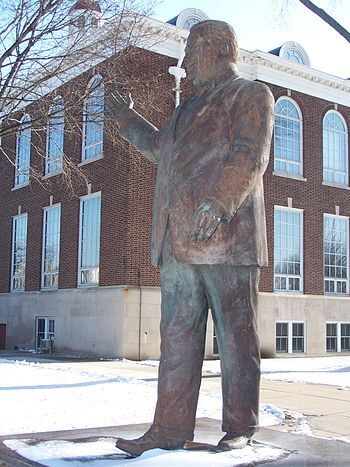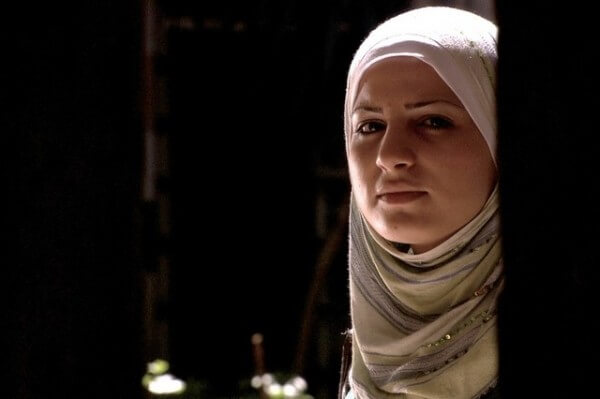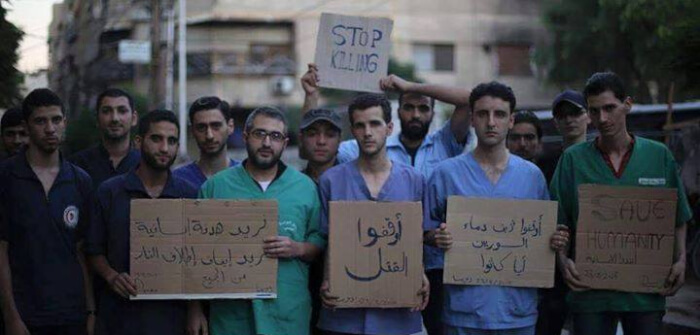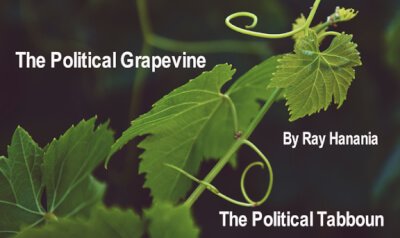The Tabboun: Dearborn removes statue of racist former mayor
The American-Arab Anti-Discrimination Committee Michigan Office (ADC-Michigan) applauds the Dearborn City Council’s decision to remove the 10-foot bronze statue of Dearborn’s former segregationist mayor, Orville Hubbard.
City workers removed the Hubbard statue from in front of the Dearborn City Hall this morning according to Deadline Detroit. ADC-Michigan had urged the city to remove the statue of Hubbard, an unapologetic segregationist who stood in the way of equal rights for racial and ethnic minorities.
On July 10, 2015, ADC-Michigan sent an official letter requesting the Dearborn City Council to remove the statue. In the letter, ADC-Michigan raised public concern about the appropriateness of government maintaining icons of racism and hatred, especially in a city like Dearborn with a growing African-American and internationally recognized Middle Eastern community.
Click here to view the letter ADC-Michigan sent to the Dearborn City Council.
ADC-Michigan Director Fatina Abdrabboh also called for removal of the racist relic through media interviews and an Op-Ed published in the Detroit Free Press on July 3, 2015.

In the Op-Ed, Abdrabboh described Hubbard as an “unapologetic segregationist who used his influence to vilify African-Americans and stifle their self-determination”. Abdrabboh concluded “We understand that Hubbard and his statue are aspects of our city’s history, but that is exactly what they need to be viewed as — history — which is not always without shame.”
Today, the ADC-Michigan welcomes the removal of this relic and views this as an opportunity for the city of Dearborn to formally acknowledge and disavow its racist past. If Dearborn decides to display the statue as part of a historical exhibit at the Dearborn Historical Museum, they should ensure that is properly displayed within the historical context of segregation. Our whole country continues to discuss the impact of race and racism in our lives, and today’s dismantling presents another opportunity.
CIHRS director participates in UN summit on violent extremism
Bahey eldin Hassan, the director of the Cairo Institute for Human Rights Studies, was invited to take part in the summit on countering violent extremism, to be held in the UN headquarters in New York on Tuesday, September 29. An initiative of the US president, the summit will be inaugurated by Barack Obama with state leaders and civil society representatives from some 60 states in attendance.
To mark the occasion, the CIHRS, in cooperation with Human Rights First, sent a joint letter to President Obama last Thursday urging governments participating in the summit to draft policies and plans to address the root causes of terrorism and violent extremism. The letter stated that a narrow focus on arbitrary security and military approaches over the last year in the Arab world has had the opposite of the intended effect, only increasing the impetus for extremism and stoking terrorist activity. The letter stated that it is no coincidence that most of the countries suffering from the dangers of terrorism are those that consistently perpetrate grave abuses of their own citizens’ rights.
Hassan spoke in a panel discussion organized by the Council on Foreign Relations in Washington DC last Friday, detailing how counterterrorism policies and practices in Egypt have entailed massive harm to human rights and exacerbated terrorism and extremism. He also met with Jehangir Khan, the director of the UN Counterterrorism Implementation Task Force, and other UN officials, and he had several meetings with officials in the White House, the US State Department, think tanks, and non-governmental organizations.
In tandem with the US summit, the CIHRS and Human Rights First are organizing a joint workshop in New York on September 30 on human rights and countering violent extremism. The workshop, which will feature experts and rights advocates from the Arab world, Africa, Europe, the US, and the UN, will examine the close link between growing terrorism and extremism and grave human rights violations.
The Tainted Veil documentary premieres in LA Oct. 16

We are proud to represent the theatrical release of THE TAINTED VEIL, an important and fascinating documentary feature film for a precarious time. The film provides a perfect opportunity to explore a rapid-fire-changing world where a woman’s identity is at its core.
Directed by Ovidio Salazar, Nahia Al Fahad and Mazen al Khayrat the film begins a one-week Oscar-qualifying run in Los Angeles on Friday, October 16th at the Pasadena Laemmle Playhouse 7 and in NYC at the Cinema Village on December 11th. We want to make sure the film is on your screening radar in hopes of lending coverage.
Women have struggled for freedom since the beginning of time. We see it in American politics with religious beliefs limiting women’s legally-ensured but often challenged reproductive rights. In Islamic society, we see it in evidence with the ubiquitous hijab or headscarf worn by Muslim women. Many would never question wearing the hijab, dutifully remaining faithful to ancient law. Now, however, today, 21st century Muslim women are finding and using their voices and, quite literally, their heads to determine their right to personal freedom. THE TAINTED VEIL explores these fascinating perspectives as told by Muslim women, scholars and others for whom a simple headscarf holds a myriad of meanings.
The title,THE TAINTED VEIL, refers to the hijab or headscarf, worn by Musllim women the world over. It is no doubt the most noticeable and misunderstood badge of their religion. It’s ironic in that modern women are turning to the hijab, embracing a symbol with such a dark history as a source of pride and comfort. Curious and controversial, the hijab raises many questions. THE TAINTED VEIL seeks to shed some light on this ancient custom and its recent revival today.
For centuries under Islamic law, Muslim women have been forced to cover their heads in honor of Allah. The hijab represents a woman’s modesty. It is a means of hiding one’s beauty to avert sexual advances from men. Islamic law taught that women were a threat to men merely by virtue of being born female. More repressive Islamic sects insist that women’s bodies be completely covered except for the hands and face. These practices are widespread even today, though change is happening and new possibilities become realities, many of them forged by courageous Muslim women.
THE TAINTED VEIL offers a range of perspectives from male and female Islamic scholars, established clergy, educators, conservatives, liberal thinkers and women who have worn or wear the hijab themselves. Powerful statements and passionate arguments are proposed with strong conviction and divergent points of view In a debate that runs the gamut of possibility.
Fascinating and unpredictable, women share ideas about wearing the hijab as they consider their relationship to the practice. In the film, a middle-aged attractive mother jokingly refuses to wear the hijab because it makes her feel fat. Her daughter insists on wearing the hijab because it makes her feel secure. University students, progressive in other areas, take solace in wearing the hijab, made more safe or given a sense of well-being simply by covering their heads.
As times change, ongoing social shifts occur. Human migration initiates in a more globally integrated world, but not a tolerant one. With ISIS marauding murderously on one side of the globe, old-fashioned religious intolerance is on the rise in the U.S.. These are dangerous times. It’s hard to keep up as the world shifts by seconds. Wearing the hijab may be left over from centuries ago, but it may turn out to be the most modern and powerful statement a Muslim woman can make.
Young Muslim women experience vastly different cultures than their mothers and grandmothers, their trajectory changes as opportunities rise or fall away. Many want to be fashionable, unique, professional and ultimately empowered through the freedom to choose. While a majority of Muslim women remain bound to religious tradition, a new breed of self-determined women is emerging. The stigma of the ancient hijab is beginning to fade. A movement is evolving as old traditions take on new meaning. Today, Muslim women’s choices are as varied as the colors of the headscarves they can now deny or embrace without subjugation.
Filming on THE TAINTED VEIL began in 2008 in nine counties before a wave of revolution swept over those locations and countless lives. While infinite questions surround the hijab – answers prove surprising. Each woman must choose for herself, but whether she exposes her hair uncovered or wears ahijab, she makes a statement. Even silent, she is not without a message, her headscarf telegraphing her identity and instigating dialogue.
The controversy continues. How can it not? History will repeat itself, yet the future is now.
THE TAINTED VEIL is produced and directed by Ovidio Salazar and directed and executive produced by Nahla Al Fahad and Mazen Al Khayrat. Co-directed by Ovidio Salazar, Nahia Al Fahad, Mazen al Khayrat, the film is a production of Anasy Media.
Deepest condolences on the passing of Dr. Jamal al-Barzinji
It is with deepest sadness that we offer condolences for the passing of our dear brother, Dr. Jamal al-Barzinji, the elder statesman of the American Muslim community and a pioneer in institutional building in America, on the morning of September 26.
Dr. al-Barzinji worked tirelessly to actualize American Muslim empowerment by fostering unity and cooperation at every turn. In small and large ways, Dr. al-Barzinji was involved in every significant American Muslim project in the past 40 years. His visionary impact is witnessed and experienced by many across this country; and even those who did not know or meet him are indebted to what he set in place for all to benefit from, including the most recent attempts at countering Islamophobia.
We will forever be blessed by his courage, humility, generosity, unwavering stands for social justice and the readiness to speak truth to power.
We ask Allah to grant our dear brother Dr. Jamal al-Barzinji the highest abode in paradise, to forgive his shortcomings, and to extend mercy and blessings upon him. May Allah grant the al-Barzinji family patience and solace during this difficult time. — American Muslims for Palestine
SAMS: Syrians have a voice that deserves to be heard



- Israelisnipers shooting and killing hospital workers in Gaza - December 11, 2023
- CAIR Condemns Israeli Executions of Wounded, Unarmed Palestinian in West Bank - December 11, 2023
- Arab and Muslim American voters face a “simple choice” between Biden’s inhumanity and Trump’s edgy politics - December 9, 2023















